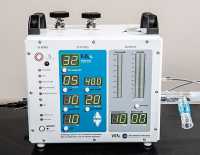
08 May MGH Study Finds Majority of COVID-19 Patients on Ventilators Do Not Die
MedicalResearch.com Interview with:

Dr. Alladina
Jehan Alladina MD
Massachusetts General Hospital
Pulmonary and Critical Care Medicine
Boston, Massachusetts
MedicalResearch.com: What is the background for this study?
Response: During the pandemic, clinicians around the world have shared anecdotal experiences to help inform care of patients with COVID-19. However, these anecdotes and observations, without careful analysis, can bias clinicians; many clinicians have even recommended experimental therapies based on this information alone.
To that end, the goal of our study was to rigorously examine the respiratory failure experienced by critically ill patients with COVID-19 and understand their response to the standards of care for respiratory failure.
MedicalResearch.com: What are the main findings?
Response: The most important finding was that mortality among our group of mechanically ventilated patients is not nearly as high as has been reported – just under 17% with a minimum of 30 days of follow up. That means that the majority of even the sickest patients with coronavirus do get better with existing evidence-based and guideline-supported treatment for respiratory failure. We also found that most of our mechanically ventilated patients with COVID-19 had acute respiratory distress syndrome or ARDS, a lung disease that is well known to critical care physicians and one that we know how to treat.
MedicalResearch.com: What should readers take away from your report?
Response: I would emphasize that contrary to what is being publicized in the media, the majority of our patients on ventilators did not die. In fact, the majority not only were successfully extubated but also were able to leave the intensive care unit. While COVID-19 is clearly a devastating disease that has affected us all in some way, our data should provide some hope that patients can get better with diligent adherence to evidence-based therapies and quality measures that we know from prior research improve patient outcomes.
I hope that both patients and clinicians will not be adversely influenced by premature data suggesting extraordinarily high adverse outcomes and mortality in mechanically ventilated patients when, in fact, it seems thus far that mortality may not be substantially different compared to patients with respiratory failure from other causes in the pre-COVID era.
MedicalResearch.com: What recommendations do you have for future research as a result of this work?
Response: The biology of SARS-CoV-2 and pathophysiology of COVID-19 infection need to be better understood to guide informed treatment decisions going forward. I am particularly interested to learn more about different subclasses or phenotypes of respiratory failure that likely exist within the spectrum of disease that we are seeing. As we continue to gather data on more patients, it will be important to characterize these subclasses and most importantly study if they respond differently to treatment.
MedicalResearch.com: Is there anything else you would like to add?
Response: This pandemic is a time of high anxiety and strong emotions for many, particularly for those affected directly by the disease but also for providers caring for patients. There is a tendency to rely on anecdotes and a sense of urgency to do something. While I am certain that the biology of the novel coronavirus will continue to be unraveled and am quite hopeful that we will find interventions to both prevent and treat the disease, until that time we must resist the urge to try new and unproven therapies at the expense of best supportive care and evidence-based medicine.
I have no disclosures.
Citation:
Respiratory Pathophysiology of Mechanically Ventilated Patients with COVID-19: A Cohort Study
https://doi.org/10.1164/rccm.202004-1163LE
PubMed: 32348678
Published Online: April 29, 2020
David R. Ziehr ; Jehan Alladina , Camille R Petri ; Jason H. Maley ; Ari Moskowitz , Benjamin D Medoff , Kathryn A Hibbert , B. Taylor Thompson , and C. Corey Hardin
American Journal of Respiratory and Critical Care Medicine
JOIN OUR EMAIL LIST
[mailpoet_form id="5"]We respect your privacy and will never share your details.
[last-modified]
The information on MedicalResearch.com is provided for educational purposes only, and is in no way intended to diagnose, cure, or treat any medical or other condition. Always seek the advice of your physician or other qualified health and ask your doctor any questions you may have regarding a medical condition. In addition to all other limitations and disclaimers in this agreement, service provider and its third party providers disclaim any liability or loss in connection with the content provided on this website.
Last Updated on May 12, 2020 by Marie Benz MD FAAD
